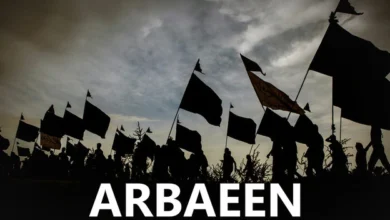Shahdat Imam Taqi (A.S.):A Great Preacher

Introduc Of Imam Taqi al-Jawad (AS) the Ninth Holy Imam
Name: Muhammad bin Ali.
Titles: At-Taqi, Al-Jawad.
Cognomen: Abu Jafer.
Father: Imam Ali Reza(AS).
Mother: Sabika (also known as Khaizaran Khatoon).
Birth: 10th Rajab 195 A.H. Madina.
Martyrdom: 29 Dhu Al Qadah 1444. Baghdad.
Shrine : Kazmain
Imam Taqi (AS) was born on Rajab 10, 195 A.H. in Madina, the city of his grandfather, the Messenger of Allah (S.A.W.), under the care of his father, Imam Ali bin Musa al-Reza (AS), who was qualified for leadership (Imamate), a lofty status, leadership in the ummah, and Islamic Sharia and its laws.
The Abbasid caliphate was in turmoil between Harun Rashid’s sons, Amin and Ma’moon, when the Imam Taqi (AS) was born.The conflict between the Abbasid caliphs and those political events fascinated the Muslims in the city of his grandfather, the Messenger of Allah (S.A.W.), including religious scholars, jurists, governors, and common people. In 200 A.H., Ma’mun, the caliph, called him to Merv, his capital and named him heir to inherit the caliphate following Ma’mun’s death.
After several refusals and abstentions, Imam Reza (AS) was obliged to leave Madina and go to Merv, Khurasan, Iran, to accept Ma’mun’s invitation. Before travelling to Merv, He took his son, Imam Taqi (AS), and left Madina for Mecca to visit the Sacred House (Ka’ba) and say goodbye.
Imam al-Reza (AS) completed the hajj with his four-year-old son, al-Jawad.The young Imam Taqi showed his love for his father by insisting on staying beneath the holy hug. He struggled to return to Madinah alone after his father wrote in his parting letter to the Sacred House that he would not return.
The sad moments of farewell ended and the hour of departure approached the young Imam Taqi (AS) returned home to Madinah with the yearnings of love, the adherence of a son for his father; his father moved towards Merv while his heart departed to Madina, following the procession of the beloved Al-Jawad.
Letters to Imam Taqi, Imam al-Reza’s son
Imam al-Reza (AS) relaxed at Merv, the Abbasid capital, while still thinking about his son. From there, AS wrote, advised, guided, and cared for him. According to historians, Imam al-Reza (AS) called his son al-Jawad (AS) “Abu Ja’far” in his correspondences.
Imam Taqi (AS) Divine Leadership
When his father was martyred, Imam Taqi (AS) was young, and his personality was debated and argued about. History and biographies highlight the young Imam (AS)’s personality and leadership potential.
Imam al-Reza was asked the same questions when Imam Taqi (AS) was born to determine who would succeed al-Reza (AS). Muhammad al-Jawad (AS) was a child. How could he lead at this age? Indeed, Imam al-Reza (AS) consistently confirmed that his son, Muhammad Taqi al-Jawad (AS), would be the Imam after Him.
Ibn Qulawaih quoted Kulaini, Hussain bin Muhammad, Khariani, and his father:
“I (Khayrani’s father) was standing in front of Abul-Hassan al-Reza (AS) in Khurasan. Someone questioned him: ‘My lord, if something happens, to whom would Imamat belong?”
“Abu Ja’far (al-Jawad), my son,” He said. The speaker said Abu Ja’far was too young. Abul-Hassan al-Reza (AS) replied: “Allah, may He be praised, sent Jesus, son of Mary, to be an apostle, a prophet, the bringer of a revealed law (Shari’a), to begin (his mission) when his age was younger than that of Abu Ja’far (al-Jawad), peace be upon him.”
“When He mentioned something and, then, said: ‘What need have you for that? Here is Abu Ja’far, whom I have brought into my meetings and whom I have made to be my successor.’ Then, he added: ‘We are the Ahle Bait. Our young inherit from our old, like one feather (on a wing) following the next.’
In his book “Uyoon Mu’jizat,” Allamah Majlisi recounted incidents during that key time in leadership, including the following:
“It was pilgrimage season. Some jurisprudents (Fuqaha’) of Baghdad and other nations and their religious scholars, numbering 80, went to Medina to perform Hajj ceremonies and then intended to see Imam Taqi (AS). When they reached the house of Ja’far al-Sadiq (AS), they entered and sat on a big carpet because it was empty.
Abdullah bin Musa, Imam al-Reza’s brother, took the meeting’s helm. A caller arose and said, “This is the son of the Messenger of Allah (s.a.w.), thus, whosoever has any question, he may ask him.” Abdulla bin Musa, Imam Taqi’s nephew, replied improperly. His replies perplexed and upset the Shi’a, so the jurisprudents left the court and told each other that Abu Ja’far (the Imam) could have answered all Abdullah bin Musa’s queries.
“Then, a door was opened at the front of the gathering, and Muwafaq, theImam Taqi’s servant, entered and said, “This is Abu Ja’far Imam Jawad (AS).” Everyone rose up and greeted him, then the Imam (AS) entered.
He (AS) sat while everyone was silent, then the questioner stood up and asked him (AS) several questions, which He (AS) answered wonderfully and accurately, making everyone pleased, thankful, and praising Him.
They answered, “Indeed, your uncle, Abdullah, issued rulings such and such.” He (AS) replied, “There is no deity but Allah, my uncle!” It’s lovely to stand tomorrow (on the resurrection day) before His hands and hear Him say, “Why did you deliver judgements (religious decrees) to My slaves regarding things you did not know, when there was someone among people who had more knowledge than you?”
Religious scholars and jurisprudents confirmed Imam Jawad’s leadership qualifications, as did Imam al-Reza (AS) and Ali bin Ja’far.
Mamun sought to bribe the Holy Imams by making the 8th Imam his heir apparent and giving him power and riches, but it failed.He attempted again to influence the 9th Imam with power and riches at a much younger age.Mamun still oppressed the Ahle Bait (AS) family and followers.
Mamun called the young Imam Taqi (AS) from Madina to Baghdad and offered his daughter, which infuriated his family (Banu Abbas). To prove Imam Taqi’s excellence even at a young age, he arranged a meeting between Imam Taqi and the most learned man of his time, Yahya bin Athkam, the Chief Judje.
Imam Taqi (AS) read his own Nika (the khutba of which is used today) with the Mehr of 500 dirhams. Imam wrote a letter to Mamun that he would also give Ummul Fadhl Mehr from the wealth of Aakhira in the form of 10 duas for fulfilling any hajaat (desires) .Thus his title, Al-Jawad (the generous one).
Hirze Jawad:
Ummul Fazhl was disobedient to the Imam Taqi throughout their year in Baghdad.She was envious and upset when she learned that the Imam had another wife (from Ammar-e-Yasir’s generation) and children. She protested to her father, who now saw that his plot to keep the 12th Imam in his progeny had failed.
He was enraged and drank heavily before going to the 9th Imam Taqi’s house and attacking him with a sword. Ummul Fazhl and a servant saw the attack and thought the Imam was dead. Mamun woke up the next morning and was planning to dispose of Imam’s body when he saw Him well and unharmed.
He was bewildered and questioned the Holy Imam Taqi, who showed him an amulet called Hirze Jawad from his grandmother, Hazrat Fatima Zahra (SA), that protected the user from all but the angel of death.
We also observed how Ma’mun held meetings and councils in which he invited scholars, thinkers, and jurisprudents like the Qazi ul-Quza (Chief Judge) of the Abbasid state, Yahya bin Aktham, for scholarly discussions and debates that lasted hours and days. They introduced Imam Taqi (AS.) to critical legislative and theological questions, which he answered wisely and accurately.
The debate was attended by top state officials, military commanders, and other leaders. The Qazi, Yahya bin Aktham, approached Abu Ja’far al-Jawad (AS) and asked him some questions he had prepared.Imam Taqi (AS) answered them correctly and showed the reason for their correctness.
Thus, Yahya and Imam Taqi(AS) argued:
“Ask me anything,” the Imam Taqi continued, echoing his ancestors.
“What is your opinion concerning a man who indulges in hunting while in Ihram,” Yahya questioned the Holy Imam Taqi. (Pilgrims cannot hunt under religious law).
The Imam immediately replied, “Your question is vague and misleading. You should have definitely mentioned whether he hunted within the jurisdiction of the Ka’ba or outside; whether he was literate or illiterate; whether he was a slave or a free citizen; whether he was a minor or a major; whether it was for the first time or he had done it previously; also, whether that victim was a bird or some other creature; whether the prey was small or big?
The Holy Imam Taqi’s comments stunned Qazi Yahya and the crowd. Qazi Yahya’s expression showed hesitation.
Thus, the historical period and its religious scholars and jurisprudents acknowledge the leadership of Imam Taqi (AS) to follow his forefathers and bear the religious, scholarly, and political burdens of divine succession of the Holy Prophet (S.A.W.).
His knowledge:
During his nearly 17-years tenure,Imam Taqi (AS) enriched and preserved the academic school. Dependence on text and narration of the Messenger of Allah (S.A.W.) and precise interpretation and deduction of both the Book (Quran) and Prophet’s traditions (Sunnah) characterized the Holy Imam’s time. In addition, the Holy Imam’s concern for intellectual knowledge and science, in which the Imams of Ahle Bait and their students greatly participated, developed, enriched, and expanded its circles to the point that it became a lofty declaration and well-fortified fortress for Islamic thought and Shari’a.
Like his forebears (AS), Imam Taqi (AS) employed many methods to do scientific research, including:
- Teaching students and scholars to write, record, and preserve what emanates from the Holy Imams of Ahle Bait (AS) or to write, publish, and categories.
In his book “Rijal,” Sheikh Tusi listed 100 intimate friends of Imam Taqi (AS) and his narrators, including two women, who studied and were educated under his supervision.
All these religious experts referenced Imam Taqi (AS) and published several Islamic science and knowledge works. They contributed innovative research to Islamic schools.
The volumes of “Rijal” described the close associates of Imam Taqi (AS) and their situations, publications, and works.
- Appointing deputies and ordering them to disperse across Muslim territories to be real callers to Islam, follow it, and preach its divine rules.
The correspondences of Imam Taqi (AS) with his deputies in different regions of the Muslim world to promote Islamic religion and what they learnt from the Household of the Holy Prophet (S.A.W.) and their wisdom have been documented in history.
- Academic debates and conversations. Traditions and narrations have thoroughly documented discussions and arguments in many disciplines and knowledge, defending Islam and setting its foundations in monotheism, jurisprudence, interpretation, and narrations.
Different studies were discussed. Defending Islam and opposing Muslim perversions and mindsets were among them. Repairing ideological errors among certain Muslims, such as exaggeration and reincarnation, or explaining Islam and its many domains.
The Holy Imam Taqi Political Career:
The Holy Imams of Ahle Bait (AS), their followers, and those who supported them opposed the Umayyad and Abbasid rulers, who usurped the caliphate and imposed their tyrannical rule on Muslims, and strayed from the political course decreed by the Holy Messenger of Allah (S.A.W.) for his Ummah.
Ma’mun’s political slogans and programmes sought to gain popular support and quell Shi’ite uprisings. However, Ma’mun’s anti-Islamic actions led to Shi’ite upheavals.This strategy did not continue long, as the Abbasid rulers began to injure and hinder the Holy Imams of Ahle Bait (AS).
Imam Taqi’s wisdom on politics:
Studying Imam al-Jawad’s (AS) historical documents and the Abbasid authorities’ attitudes towards the Holy Imam, one can see that he was at the top of secret political and ideological essence, practiced his activities in secret, and had a deep impact on awakening the people’s feelings.
Books of traditions, history, and narrations recorded some of these letters sent by Imam Muhammad Taqi al-Jawad (AS) to his companions, followers, and representatives, revealing the Holy Imam’s (AS) and his companions’ secret political activity and the ideological and political climate of the time.
These letters show the Holy Imam (AS)’s followers and his sectarian cultural and political activity at that time, as well as his deep relationship with his companions and how financial assistance was provided to him from different Muslim lands to support his activities.
The Abbasid authorities monitored the Holy Imam’s activities and took various measures to prevent them from spreading. Thus, these letters show the continuation of this activity and the call to support the holy family of the Prophet (AS), the depth of their effect, and the influence of their ideological and political tendencies in people’s lives despite the terror and dangers they faced.
Abbasid Caliphs’ View on Imam Taqi (AS)
To study and analyses the attitude of the two Abbasid caliphs, Ma’mun and Mu’tasim, who succeeded him, towards Imam Muhammad Taqi al-Jawad (AS) shows the importance of His leading personality, his esteemed status in the hearts of the people, and the Ummah’s inclinations towards him. The Holy Imam was seen as a real representative of Ahle Bait and a successor to His guiding grandfathers (peace be upon them).
In 211 A.H., Ma’mun called the Holy Imam (AS) from Madina and married him to his daughter, Ummul Fazl. Ma’mun fought his cousins, the Abbasids, over this marriage. Ma’mun tried to incorporate Imam al-Jawad (AS) into his collaterals and limit his intellectual and political activities.
As observed, the Holy Imam (AS) was different. AS performed well. The Holy Imam (AS) worked on every subject He could. He (AS) refused to stay in Baghdad to avoid the authorities’ siege and control and returned to Madina, his birthplace and his fathers’ home, a center of knowledge, faith, and hearts, to achieve his goals as an Imam (leader) of the Ummah and a Shari’a pioneer.
Imam Taqi’s Martyrdom:
Mu’tasim succeeded Ma’mun. Like his Abbasid forefathers, Mu’tasim cared about Ahle Bait (AS) leadership and political and academic reputation. In 219 A.H., he deported Imam al-Jawad (AS) from Madina to Baghdad for fear of his popularity and influence. He did this to pull the Holy Imam under close authority and scrutiny and isolate him from his popular, political, and academic roles.
Indeed, Imam al-Jawad (AS) was banished to Baghdad from Madina until 220 A.H. when the Abbasid caliph Mu’tasim ordered his wife Ummul Fazl to poison Him.
The Holy Imam (AS) was martyred in Baghdad on the 29th of Zel Qadah in 220 A.H. and buried in Quraish’s graveyard behind his grandfather, Imam Musa bin Ja’far (AS), the seventh Holy Imam, who became known as Kazmain.
Imam Taqi al-Jawad (AS) maxims
- 1 – When a man sought counsel, Imam al-Jawad (AS) said: Put your head on steadfastness, accept poverty, reject the lusts, resist your desires, and know that you cannot be out of Allah’s sight. Consider your conduct.
- 2-Allah told a prophet: Your asceticism will soothe you. I’ll love your dedication. Did you hate My adversaries and love My disciples?
- 3-Highway bandits took Imam al-Jawad(AS)’s considerable amounts of fabric. The caravan leader told the Imam. The Holy Imam (AS) replied: Allah gives us pleasant gifts and deposits loans, and He seizes whatever He wills with benefits and merits. Intemperance will squander prizes. Allah shields us.
- 4 – He who disliked a matter he observed is the same as those who were away from it, and he who loved a matter he missed is the same.
- 5 – A listener serves a caller. If the caller represented Allah, he served Allah. If the caller represented Shaitan, he served him.
- 6- Dawud-bin-al-Qasim: I asked Imam al-Jawad (AS) what “Samad” means. He said: “Samad” means navelless. I responded that people say “samad” is something without an interior. Imam al-Jawad (AS) replied: “Something without interior lacks navel.
- 7 – Abu-Hashim al-Ja’fari: On Imam al-Jawad (AS)’s wedding day with Ummul-Fazhl, daughter of Al-Ma’mun. Lord, today’s bounty is definitely big for us. O Abu-Hashim, Allah has blessed us today. “Yes, lord,” I responded, “What should I say about the day?” Imam al-Jawad (AS) replied: Say only nice things about the day to get from these wonderful things. “Master,” I said.
Imam Taqi (AS) said: Follow this guidance, and you will be directed to the right and witness only good.
- 8: Imam al-Jawad (AS) wrote to a disciple: We are simply ladling from this world. Whoever shares his acquaintance’s faith will always accompany him. The next life is the last.
- 9—Delaying repentance is deceit, extreme procrastination is confusion, arrogance against Allah is perdition, and perseverance on sins is protection from Allah’s unexpected vengeance. Only the lost are safe from Allah’s wrath. Quran 7:99.
- 10 – A cameleer who accompanied Imam al-Jawad (AS) from Medina to Kufa sought extra money after the Imam gave him 400 dinars. The Holy Imam (AS) said: How weird! Do you not realize that Allah’s expanding bounties will halt when slaves stop thanking Him?
- 11 – The Holy Prophet (S.A.W.) accepted the pledge of allegiance of women by dripping his hand in a bowl of water. When he took his hand out, women dripped their hands in the bowl and declared the shahada, faith in Allah, and belief in the Holy Prophet (S.A.W.) and the matters they had to acknowledge.
- 12 – Showing something without preparation ruins it.




